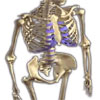Menopause: An Overview
- What is menopause?
- What changes can I expect during menopause?
- Living with menopause
- Other conditions associated with menopause
What is menopause?
Video: Menopause
 | Menopause affects all women around their fifties. It is not a disease; rather, it is a normal part of life. Dr Joe Kosterich talks about the causes, symptoms and treatments of menopause. |
Watch the video Menopause.
Menopause
 | Menopause is the term used when women permanently stop having menstrual periods. It can be diagnosed after one year with no periods following the final menstrual period (FMP). Menopause may occur naturally, or may occur due to chemotherapy, surgery, or radiation. |
For more information, see Menopause.
What changes can I expect during menopause?
Hot flushes
 | Hot flushes (also known as hot flashes, or night sweats if they occur at night) are the vasomotor symptom of menopause. They are the number one complaint of women in the perimenopausal and post-menopausal period. |
For more information, see Hot Flushes in Menopause.
Mood swings
 | Mood changes can occur during and after menopause. They can take mild forms such as feeling irritated and upset, or more severe forms such as rapid temper changes and aggression. There are a few theories about what causes mood changes in menopause. |
For more information, see Mood Swings in Menopause.
Sexual changes
 | While many symptoms of menopause are temporary (e.g. hot flushes) changes to sexual function that occur at menopause are typically permanent. Sexual feelings change in the peri-menopausal period and persist post-menopause due to hormonal changes. |
For more information, see Sexual Changes in Menopause.
Skin changes
 | Menopause is a time of significant changes to the skin. The impact of menopause on skin is minor compared to the impact of other factors, particularly UV exposure. However, it can have a significant impact on the psychological health of menopausal women. |
For more information, see Skin Changes in Menopause.
Sleeping difficulties
 | Women are more likely to experience sleep disturbances in the menopausal period than at other times of life. Poor quality sleep is a common complaint amongst menopausal women, of whom 25–50% report sleep difficulties, compared to some 15% of the general population. |
For more information, see Sleep Disturbance in Menopause.
Living with menopause
Tips for a great sex life after menopause
 | There are some strategies that can help women overcome negative factors influencing their sexual function. Keeping a healthy body and mind,and engaging in regular, varied sexual activity are some important aspects of maintaining sexual function after menopause. |
For more information, see Tips for a Great Sex Life after Menopause.
Managing Vaginal Dryness
 | Vaginal dryness is common in and after menopause and can lead to burning and a loss of enjoyment in sex. But it’s easily treated, Dr Joe explains all the options. |
For more information, see Managing Vaginal Dryness: Interview with an expert.
Husband’s guide to great sex after menopause
 | While the symptoms of menopause are natural, they can cause significant distress for menopausal women and their partners, and can disrupt the couple’s sex life. Men play an important role in keeping up a great sex life during and after their partner’s menopause, and there are specific steps they can take to improve their sex life. |
For more information, see Husband’s Guide to Great Sex after Menopause.
Eating and exercising your way through menopause
 | Healthy eating and regular physical activity are an important part of healthy living and important measure for women going through menopause. Regardless of the other treatments menopausal women choose to use, lifestyle measures to improve diet and physical activity should be implemented. |
For more information, see Eating and Exercising Your Way Through Menopause.
Guide to living well with menopause
 | Menopausal symptoms can significantly and negatively impact on a woman’s wellbeing and quality of life. However, there are many ways to manage menopausal symptoms including simple lifestyle and behavioural measures, as well as pharmaceutical and herbal remedies. It’s a time of significant change but it is possible to live well with menopause. |
For more information, see Guide to Living Well with Menopause.
Other conditions associated with menopause
Video: Menopause and breast cancer
 | Professor Christobel Saunders talks about managing menopause symptoms after breast cancer. |
Watch the video Menopause and Breast Cancer.
Osteoporosis
 | For more information on osteoporosis, including its effect on bones and the importance of nutrition and dairy, as well as some useful videos and tools, see Osteoporosis. |
Heart health
 | For more information on keeping your heart healthy, including information on how the heart works, the effect of cholesterol and eating for heart health, as well as some useful videos and tools, see Heart Health. |
Dates
Tags
Created by:

 Login
Login














